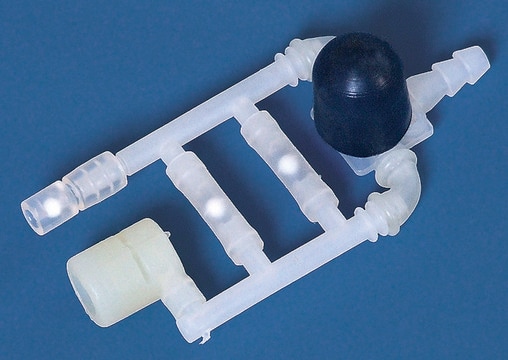Z331732
BRAND® micro pipette controller
ejects disposable micropipettes, without touching them
Sign Into View Organizational & Contract Pricing
All Photos(1)
About This Item
UNSPSC Code:
41121500
NACRES:
NB.01
Recommended Products
material
metal (with autoclavable tube)
plastic (autoclavable)
silicone
manufacturer/tradename
BRAND 25800
volume
0.05-1 mL
Related Categories
General description
The micro pipette controller is an indispensable accessory for sampling with disposable micropipettes with ring mark and many small volume pipettes up to 1 mL. The integral ejection device allows the disposal of contaminated pipettes up to 50 μL without touching them. Resistant to steam sterilization (121°C / 250°F).
Filling/Discharging:
Thumb wheel for filling, setting the meniscus, and discharging the liquid
Venting:
Press button for venting so that the liquid in pipettes calibrated to deliver (Ex) can run out freely.
Ejecting:
Large key for ejecting disposable micropipettes up to 50 μl, without touching them; thus helping to prevent the transmission of dangerous viruses
Filling/Discharging:
Thumb wheel for filling, setting the meniscus, and discharging the liquid
Venting:
Press button for venting so that the liquid in pipettes calibrated to deliver (Ex) can run out freely.
Ejecting:
Large key for ejecting disposable micropipettes up to 50 μl, without touching them; thus helping to prevent the transmission of dangerous viruses
Other Notes
BR25800 (India)
Legal Information
BRAND is a registered trademark of BRAND GMBH + CO KG
Certificates of Analysis (COA)
Search for Certificates of Analysis (COA) by entering the products Lot/Batch Number. Lot and Batch Numbers can be found on a product’s label following the words ‘Lot’ or ‘Batch’.
Already Own This Product?
Find documentation for the products that you have recently purchased in the Document Library.
Customers Also Viewed
Duncan Bell et al.
Zoology (Jena, Germany), 143, 125833-125833 (2020-10-16)
Stages of the moult cycle of the amphipod Gammarus pulex have been previously characterised based on the examination of either apolysis of the 3rd dactyl, or the whole body and eye appearance. In the current study the aim was to
Fei Zhang et al.
Journal of cellular biochemistry, 122(2), 222-234 (2020-09-13)
Oxidative stresss in the microenvironment surrounding lesions induces apoptosis of transplanted bone-marrow-derived mesenchymal stem cells (BMSCs). Hence, there is an urgent need for improving antioxidative-stress processes of transplanted BMSCs to further promote their survival. The present study reports the role and mechanism
Maria Olga Kokornaczyk et al.
Scientific reports, 10(1), 570-570 (2020-01-19)
The aim of the present study was to investigate if patterns obtained from evaporating droplets of pharmaceutical preparations reveal the impact of succussion on such medicinal products. For this purpose, five pharmaceutical preparations (Echinacea 10-2, Baptisia 10-3, Baptisia 10-4, Luffa
Morten Schiøtt et al.
eLife, 10 (2021-01-13)
The symbiotic partnership between leaf-cutting ants and fungal cultivars processes plant biomass via ant fecal fluid mixed with chewed plant substrate before fungal degradation. Here we present a full proteome of the fecal fluid of Acromyrmex leaf-cutting ants, showing that
Simon Tragust et al.
eLife, 9 (2020-11-04)
Animals continuously encounter microorganisms that are essential for health or cause disease. They are thus challenged to control harmful microbes while allowing the acquisition of beneficial microbes. This challenge is likely especially important for social insects with respect to microbes
Our team of scientists has experience in all areas of research including Life Science, Material Science, Chemical Synthesis, Chromatography, Analytical and many others.
Contact Technical Service











